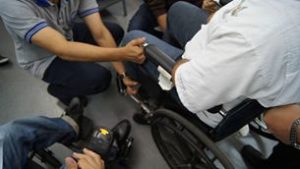 Jesuit Social Services recently provided a submission to the discussion paper of the Victorian state disability plan for 2017-2020. The Victorian state disability plan is a government policy framework for improving the way services and environments work for people with disabilities. Our submission, highlighted the issues for people with cognitive disabilities in the criminal justice system. ‘Cognitive disability’ refers to a range of conditions such as acquired brain injury (ABI), foetal alcohol syndrome disorder (FASD), intellectual disability, and borderline intellectual disability. A cognitive disability can vary significantly in severity, and some people may face additional difficulties such as a mental illness or physical health issues.
Jesuit Social Services recently provided a submission to the discussion paper of the Victorian state disability plan for 2017-2020. The Victorian state disability plan is a government policy framework for improving the way services and environments work for people with disabilities. Our submission, highlighted the issues for people with cognitive disabilities in the criminal justice system. ‘Cognitive disability’ refers to a range of conditions such as acquired brain injury (ABI), foetal alcohol syndrome disorder (FASD), intellectual disability, and borderline intellectual disability. A cognitive disability can vary significantly in severity, and some people may face additional difficulties such as a mental illness or physical health issues.
People with cognitive disabilities are vastly overrepresented in the criminal justice system. One Victorian study has shown that 42 per cent of men and 33 per cent of women in prison have an Acquired Brain Injury (ABI), compared to two per cent in the community. This startling figure suggests that many people in prison with an ABI may have had pre-existing difficulties that put them at risk of criminal justice involvement, and that they may well have been involved with the criminal justice system before acquiring their disability.
Our submission also highlighted the links between disability and disadvantage. In 2015, Jesuit Social Services along with Catholic Social Services Australia released the findings of its Dropping off the Edge Report (DOTE). DOTE looked at a range of factors, including the proportion of people aged 18-64 years in receipt of the Disability Support Pension in each area. Our research found that those living in 3 per cent of the most disadvantaged postcodes in Victoria are:
- twice as likely to have criminal convictions
- 3 times more likely to be experiencing long term unemployment
- 4 times more likely to be on disability support.
While not all people with a disability experience disadvantage, the impact of disability can make people more vulnerable to social and economic disadvantage. We know for example, that people with a disability experience higher rates of unemployment or underemployment. For this reason our submission argues that disadvantage must be considered as a central issue in responses to disability. This requires investment in universal programs – particularly in education and employment.
We endorse the intent of the government’s disability plan. We all have a responsibility to help remove the barriers that prevent people with a disability from having the same life opportunities as everyone else. Every Victorian should have access to the opportunities in life that will enable them to flourish – to complete their education, to get a job, to access safe and affordable housing, to raise their children in safe communities and to see the next generation thrive.
This post is written by Liz Poole, Policy Research and Advocacy Officer at Jesuit Social Services.
Image credit: Miguel Mndoza



